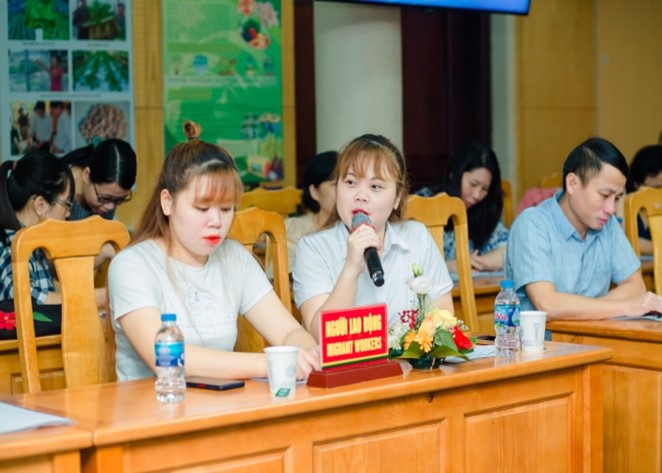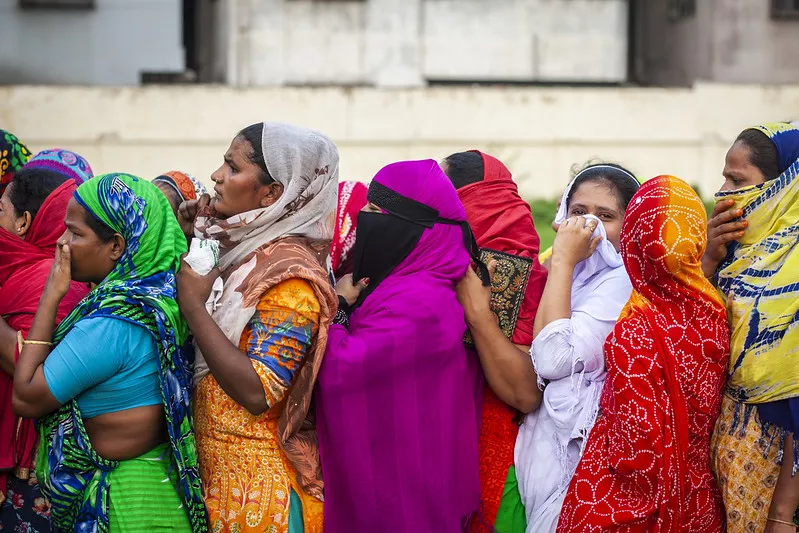During the Covid–19 pandemic, migrant workers in Northern Vietnam experienced severe food and nutrition insecurity due to a number of social, economic and institutional factors, such as: limited labour rights, low wages, precarious livelihoods, and a lack of access to social protection measures. Food and income support by the government did not reach migrant workers effectively and the current policies aimed at providing social protection to migrant workers is insufficient and far away from the reality of migrant workers as well as other vulnerability people.
Migrant workers faced challenges in accessing social protection measures and maintaining food security during the pandemic as a lack of long-term institutional support for their specific needs. Access to information for migrant workers was limited because of their lack of knowledge and resources. Employers unlawfully modified existing contracts and therefore made their livelihoods extremely precarious. While long-term solutions are needed to tackle these limitations, improving communication across multiple stakeholders and enhancing capacity for migrant workers to gain knowledge related to emergency assistance policies, social protection system and labour rights in the context of the Covid-19 pandemic is necessary to support migrant workers in taking advantage of existing mechanisms to improve their resilience.
To improve the resilience of migrant workers in the study sites in Vietnam (Hanoi and Bac Ninh) during crises, a group of researchers from Faculty of Social Sciences, Vietnam National University of Agriculture together with the researcher at IDS (UK) carried out two follow-up activities that translated the research findings to particularly capacity building, and network and connectivity impacts.
Firstly, in order to bring the voices of migrant workers to the attention of decision makers and actors engaged in the implementation process, a stakeholder workshop titled “Improving the social and economic resilience of migrant workers in northern Vietnam” was organised and engaged 40 key actors, such as: migrant workers and their representatives (the Labour Union), relevant NGOs, employers of migrant workers, community leaders, People’s Committee at the district and commune level, Fatherland Front, and representatives from the Communist Party. The stakeholders workshop improved communication across stakeholders. We explored migrants’ access to official information and enabled the migrant workers to communicate the challenges they faced during the pandemic and discussed how institutional support could mitigate them in the future. The workshop had also focused on influencing the institutional changes in, for example: emergency responses by the government, labour rights policies, and policies regarding migrant workers’ living and food environments in the long-run to reduce their vulnerability. The workshop provided an opportunity for migrant workers to share their experiences in maintaining income, accessing social protection measures, and accessing nutritious food during COVID-related lockdowns and the challenges they faced. This dialogue motivated these support actors to modify existing emergency responses to meet the reality of migrant workers and other vulnerable people in the future.
We also ran a training workshop which aimed to enhance capacity for migrant workers and to support migrant workers to access existing mechanisms to improve their resilience. Before the training workshop, we consulted with a small group of migrant workers in the Industrial Zones (IZs) in Bac Ninh and free labourers in Hanoi to discuss the setting, timing and contents of the workshop. 55 participants attended two sessions, based on three themes: emergency assistance policies, social protection systems and labour rights.
The two-day training workshop provided delegates with new knowledge to actively respond to changing situations, identified ways to defend their rights, and ensure that they know what, how and where to claim their interests during crisis. At the end of the workshop, a synthesis session documented that the learning from the workshop had engaged the representatives of NGOs, Trade Unions, local governments, and employers to motivate these actors to scale up this training approach to support migrant workers in the short-run as well as become aware of the ways to expand the coverage of current policies.
The two activities were successful in creating a forum where migrant workers communicated the challenges they had faced during the pandemic. With the voice of migrant workers heard by local policymakers who attended the two workshops, we hope this will result in future policy changes, at least in emergency response systems at local levels, to reduce vulnerability of migrant workers during the pandemic, and in broader welfare systems, to support sustainable livelihood of migrant workers. In addition, capacity building for migrant workers through the training workshop and its future applicability were also an added value of this project, promoting the sense of self-help, self-protection and active preparedness of migrant workers when unexpected situations arise.

